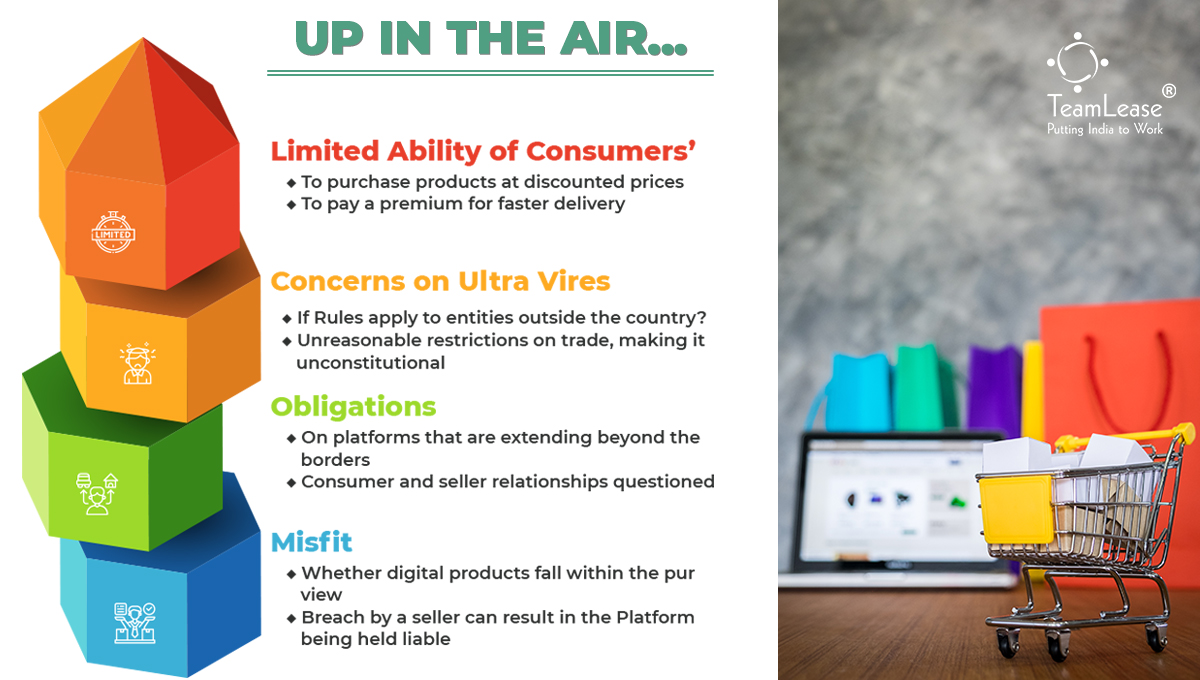13 Reasons Why: New E-commerce Rules Haunt Businesses

The new e-commerce rules had a greater and direct impact on the businesses. Those there were welcoming aspects, there have been certain aspects that cannot be ignored. Looking at the flip side of the coin, gives one a specific idea on the peculiarities of these new rules.
Concerns Still Linger
Any breach of these Rules will have to satisfy the condition of being an “unfair practice” before they are held liable. Several questions are still unanswered in these new rules, like –
1: At the functional level, is the implementation and application of the rules possible to the fullest extent?
2: Silence on the assessment licensed by an entity based in another country. (Assessment of goods assembled, packaged or manufactured in one country)
3: The kinds of digital product offerings fall within its purview?
4: If a breach by a seller can also result in the Platform being held liable?
5: If the new rules of the act are beyond the legal power or authority (ultra vires)?
6: Complicated because these rules are applied to entities outside of the country.
7: The rules’ obligations are imposed on platforms that are extending beyond the borders between consumer and seller relationships?
Up in the air…
Key Issues with New E-commerce Rules

At a deeper level:
8: Lack of Definition: Lack of uniform definition of e-commerce, since buying/selling goods online are generally considered as e-commerce/ internet commerce, even though the final delivery is largely offline.
9: Ease of Doing Businesses: The restrictions include a gamut of compliances which by increasing the regulatory burden, can reduce the ease of doing business for startups on online platforms.
10: Entry Barrier: Free trade practices that enabled startups to easily enter the e-commerce trade arena would cease to exist.
11: Burden on Sellers: The burden will eventually trickle down to the sellers affecting the top line.
12: Agreement Rejig: Any company that currently has a common beneficial ownership agreement or is associated with an e-commerce company, will not be allowed to be listed as a seller on that platform and might have to shift. This could result in building a whole consumer base from scratch involving costs and/or losses
13: Increased liabilities: For online e-tailers for all trade carried out on their platforms.
Business Impact and Probable Outcome
Although these New Rules are a welcome step in ensuring the welfare and protection of the interests of consumers using the various e-commerce platforms, these new rules will also put significant limitations on the consumers’ ability to purchase products at discounted prices and pay a premium for faster delivery.
For the platforms, the dawn appears gloomy as businesses have a host of things to comply with as per the rules laid out. There are thus multiple pointers that the businesses are worried about.
On the Lookout
As mentioned, the new rules have a flip side of the coin to look out for and these are quite haunting. Unless the concerns are answered, it is difficult to migrate everyone onto a new ecosystem without turbulence.
However, we must welcome these changes just as the rules and not as the ruler. With a positive growth outlook for the E-commerce industry, it’s necessary to take stock of the drivers of growth as they are the implicit rulers of the industry. These new rules are a stepping stone of the regulatory norms surrounding this industry to bridge the gap between brick and click marketplace models.
Latest Blogs
Test Post
ecrvbtbtbybybyb ddecececec edececece edecece h1 tag h2 tag h3 tag h4 tag h5 tag h6 tag lsit 1 list 2 list 3 wsmw swwww efgh...
Read MoreRevitalizing and Transforming Manufacturing Sector in India
Challenges Confronting India's Manufacturing Marvel Inadequate Tech-Based Infrastructure:The enhancement of competitiveness in the manufacturing sector relies heavily on innovation-driven infrastructure, particularly in areas such as...
Read MoreTemporary Jobs Sees a Spike During Festive Hiring
The seasonal hiring landscape becomes more competitive A wider set of organisations is increasing the demand for temporary jobs. Employers looking to fill seasonal roles...
Read MoreThe Road Ahead: India’s FMCG Industry, Sector and Market Insights
Primary Forces Behind the Expansion of the FMCG Sector The Development of E-Commerce: The technological revolution impacted India's urban and rural areas. There has been...
Read MoreCurious Case of Educated Unemployment Problem in India
Key factors contributing to India’s joblessness Population growth vs. job creation Quality of education Skill gap Job mismatch Economic slowdown Preference for government jobs Why...
Read More





